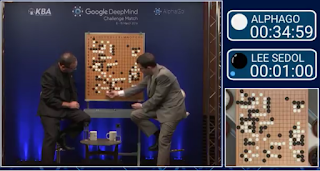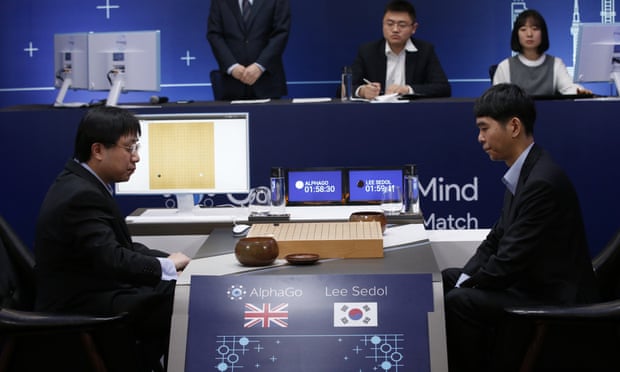Final thoughts on Alpha Go
So the 5 game match that will rock the
ages is over. Lee Sedol went down in defeat, 4-1 to Alpha Go. I was
truly hoping that Lee Sedol would be able to pick up his game today
and pull it out for humanity, but alas, that was not in the cards.
Instead of rehashing the final game, I wanted to give my final
thoughts on my impressions of Alpha Go and what this match means for
the game of Go.

Go has a long history and there have
been hundreds of people that have dedicated their lives to solving
its mysteries. The game becomes like a job and after a certain point; people improve only in subtle, small ways. Picture this: you start
learning something at the age of three or four. Most people become
professional in their early teens, the youngest being 11. At best,
you spend 7-10 years studying the game constantly. You do hundreds
of problems and battle it out with other professional hopefuls
playing game after game. I studied at a Go Dojo where children
studied 12-14 hours a day, with only breaks for food. Lee Sedol did
all that to become professional, and then to reach the top, he had to
beat out other people who worked just as hard, if not harder. He did
this year after year, from one tournament to the next. Lee Sedol and
others like him can see far into a games future and can judge
variations even with small differences. Lee Sedol's mind, his skill
at Go, is the physical manifestation of years of concentrated effort,
emotional turmoil, and perseverance.
Alpha Go rose above all that.
I won't rehash the argument that people
still run races even though we have cars. I never for once thought
that someday a computer program could not be built to beat a human at
Go. I got the impression Alpha Go was stronger than Lee Sedol. It
saw further into the game. Its moves had far reaching consequences.
It understood the territorial balance clearly. Lee Sedol was the one that had to fight Alpha Go for control of the game, for control of the territorial balance, not the other way around. It was Lee Sedol who had to sweat to find brilliant move after brilliant move, who had to maintain his level of play despite fatigue and exertion.
How do I think the Go world will change?
No one can say for sure. But Alpha Go has shown a high level of play, and already there have been some moves that people have commented on that are not "human." I can't predict the future, but there ARE some changes I think that are on the horizon.
1. People will play less for territory and more for thickness. Alpha Go let Lee Sedol have territory. By the middle game, the second phase, Lee Sedol had to fight hard against White's powerful thickness. Professional players like Takemiya Masaki play this style naturally. Takemiya was unbeatable several decades ago for playing a center oriented style. We may see a resurgence, against the current trend of super territorial play.
2. Use Alpha Go to analyze joseki. I think it would be great to use Alpha Go's algorithm to run joseki through it and see if it agrees. In the second game, we saw how Alpha Go veered away from joseki early on, and even though it looked strange, turned out to be extremely good. How many other josekis might be changed around if Alpha Go has a hand at them?
3. A commercial version of Alpha Go. The Go world would love nothing more than a computer program that could answer questions about various positions or act as a training partner. I'm sure Google doesn't want to make some of its technology commercial just yet, or at least so widespread that it gets in the wrong hands, but I think a high dan version of Alpha Go would be great for people to train. It can help show weaker players where the important parts of the board are, and even show variations.
4. Higher level professional play. If Go Dojos get their hands on it then it could lead to a Renaissance of new moves and new research by young players. No one would feel constrained by what is currently thought of as being "good" or "bad." There will just be what works and what doesn't.
5. Komi might be too much. It occurred to me that since Lee Sedol was having such a hard time beating Alpha Go as Black, it may have been because the burden of komi is just too big. Since Black goes first, White gets compensation for going second, since it is a clear disadvantage. How much compensation has changed over the years, and I think professional associations have been looking at the win rate over the years to adjust it. If Alpha Go is unbeatable as White, but only within a few points, it MAY mean komi is a bit too high.
6. Increased interest in Go. One of my videos got 15,000 hits on Youtube within the space of two days. There are people trying the game out for the first time. Everyone and their mom knows that this game went on. The people in my Korean class in China, my mother at home, and a friend of mine in Germany all knew it was happening. The entire Go community has been flooding Facebook with memes and funny videos. It felt like a coming together of a family whose members had all gone off to far flung cities and countries. With new people, and renewed interest, the Go community of the world will only get larger and more interesting.
Already I'm changing my own style and my own way of thinking to match Alpha Go. In a way, we've tread upon new territory, and I think for all Go players, it's too exciting for words.
comments




















